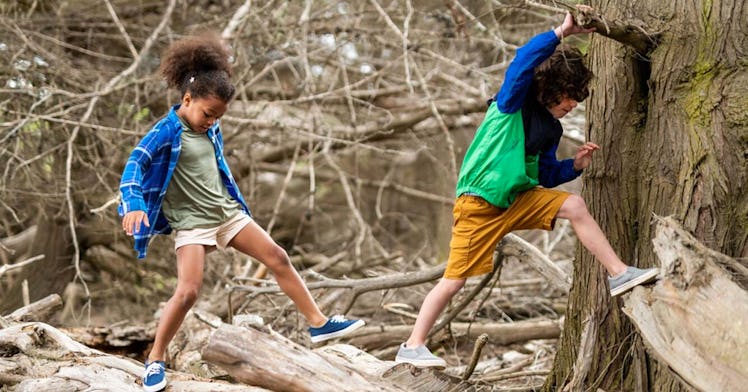6 Reasons the Best Afterschool Activities Happen Outside
Parents instinctively know their kids need to play outside. Scientists know why.

This story was produced in partnership with CLIF Kid®.
“Go play in the backyard” might be the original parenting hack, a simple request that accomplishes the twin goals of letting the kids expel some excess energy while parents stay inside and for some much-needed peace and quiet. But the benefits of outdoor time for kids are more numerous and go much deeper than any sort of hack. The body of scientific research suggests that time spent outside has myriad benefits for developing minds and bodies.
It all adds up to a lot of reasons for parents to make sure their kids (and the rest of the family) regularly spend time enjoying the wonders of nature.
Drink In the Air, Boost Self-Esteem
A multistudy analysis of 1,252 subjects in Environmental Science & Technology showed that time spent outside improved self-esteem and mood across genders and age groups. Perhaps unsurprisingly, the still-developing minds and personalities of the youngest showed the greatest improvements in self-esteem with increased time spent outdoors. And if you can, try to have your kids experience natural bodies of water; in this analysis, the presence of water generated greater positive effects.
Get Outdoors, Increase Focus
A group of Berkeley professors wanted to test the hypothesis that taking a lesson outside would help kids focus during the indoor lesson that followed it. Their study, which relied on measures of class attentiveness like teacher-reported ratings, the number of times the teacher had to stop instruction to refocus students, and independent assessments of photos of the indoor class in action, found that a “nature advantage” does exist. Across subjects and cohorts of kids, there was a significant difference between the kids who got to learn outside and those who didn’t. We’re talking half as many redirects in some cases and kids who were much, much more attentive overall.
Sponsored
The Fuel They Need to Roam Free
CLIF Kid Zbar® is an organic, soft-baked whole grain snack bar designed especially for kids. With flavors like Chocolate Chip, Iced Oatmeal Cookie and Chocolate Brownie, CLIF Kid Zbar® has energizing whole grains from organic oats to help fuel their outdoor adventures.
Play Outside, Lower Risk of Obesity
A 2016 study of 2,810 children in Head Start found that increased outdoor play time had a big effect on childhood obesity. The more children played outdoors, the more their BMI decreased over the course of the preschool year. In the end, children with high levels of outdoor play were 42 percent less likely to be obese. The authors of the study recommended that Head Start programs establish clear guidelines encouraging more outdoor time, and parents would be served well to do the same, whether it’s by taking a family walk around the neighborhood, doing some serious camping with the kids, or something in between.
Walk In the Woods, For A Different Kind of Studying
A review of twelve different studies found that access to green space is associated with the overall cognitive develop of children. More specifically, regular time outside promotes a slew of skills that help kids do better in school, from attention restoration to memory to self-discipline.
Nearby Green Space, Better Mental Health
The largest investigation into the connection between time spent in nature and mental health found that growing up near vegetation is associated with a lower risk of mental health disorders during adulthood. Using demographic data and satellite imagery for the country of Denmark (and accounting for potentially confounding factors like income, work history, and education level), researchers found that growing up near green space meant a lower chance of developing 16 mental illnesses, 15 to 55 percent lower depending on the specific illness chosen. The “why” is still a mystery, but it seems likely that spending more time in nature has benefits that run deeper than “fresh air.”
Play Outside, Care for the Planet
A study of outdoor education programs in California proved and quantified what you probably already expected: kids who participated in these programs were more likely to engage in positive environmental behaviors. Their parents reported large gains in environmental behaviors like recycling at home, suggesting that spending time in and learning about the environment was a lesson that stayed with kids well after class time was over.